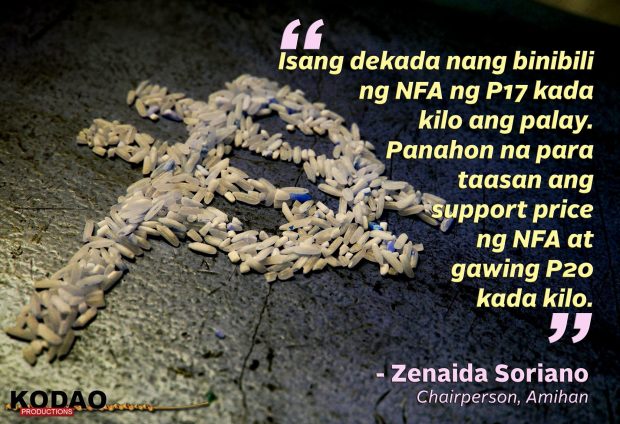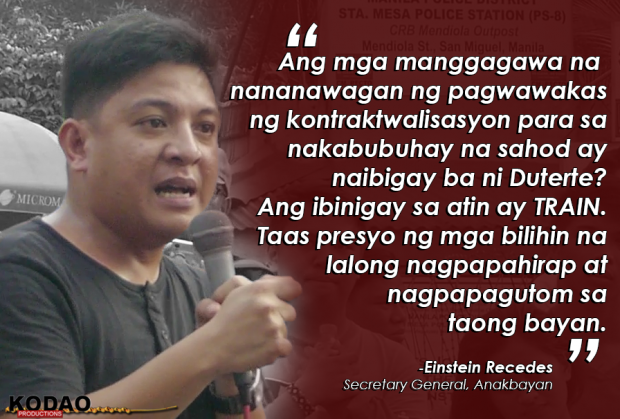IBON FEATURES – Stay the course, the country’s economic managers always insist. They will be the last to admit bad economic news because eternal sunshine is part of their job. Their recent spontaneous reactions against federalism are however more revealing. They are losing control of the economy as it is and they know the ill-conceived self-serving federalism project will just make things worse.
After just a little over two years of the Duterte administration, the economy is stumbling with adverse movements in key economic indicators. It is not yet a severe economic crisis nor necessarily about to be one soon. Still, it is clear that the fundamentals are unsound and the economy is increasingly vulnerable to a political upheaval or to a renewed global downturn.
The majority of Filipinos are poor and gained little when times were supposedly good – but they will be hit the worst when the illusion of progress is finally broken.
Unsound fundamentals
Government economists like to invoke macroeconomic ‘fundamentals’ particularly when supposed economic good news are not being felt by the people. The argument is that these are vital to eventually bettering Filipino lives so the concern for them is a concern for the masses.
This would be believable if there were not habitual inattention to things of more direct everyday relevance to people like higher wages or better social services or insistence on anti-people measures like regressive taxes. In practice, the concern about certain economic indicators is really more because they matter to the investment and production decisions of big business and foreign investors.
The administration’s problem today, even if they will not admit it, is that many of the so-called fundamentals are taking a turn for the worse.
The most headline-grabbing is inflation which is already up to 5.7% in July 2018. This is more than double the 2.5% in the same period a year ago and four times the 1.3% inflation rate in June 2016 at the start of the Duterte administration. It is the highest inflation since March 2009 or a nearly 10-year high. While businesses worry about how to plan ahead, tens of millions of the poorest Filipino households worry about how their lives are just becoming even more difficult.
Unemployment is also high. The reported low unemployment rate of 5.5% or just 2.4 million unemployed Filipinos in April 2018 is misleading. It is based on a revised definition of unemployment that among others does not count millions of discouraged workers. IBON’s preliminary estimate according to the original definition is an unemployment rate of around 9.1% or some 4.1 million unemployed. Adding the 6.9 million underemployed then means 11.1 million unemployed and underemployed Filipinos which is a sizeable one in four of the labor force.
Employment generation is in any case tepid. Job generation in April 2018 from the same period in the year before was an unremarkable 625,000 new jobs. This is just around the historical average since the 1980s and actually even less than average annual employment generation of over 800,000 since the 2000s. The quality of work is moreover undermined by low pay, poor benefits and apparently unabated contractualization.
Worse, neoliberal logic during times of high inflation means that working class Filipinos will not get meaningful wage hikes just when they need these more than ever. Economic managers will likely use rising cost-push inflation to justify keeping wages low. The government will choose to manage inflation by making Filipino working people make do with less, while ensuring that firms maintain their profits.
Worst in years
Economic growth is slowing. The 6.0% growth in gross domestic product (GDP) in the second quarter of 2018 is down from 6.6% in the same period last year. It is also the slowest in the past 12 quarters since the second quarter of 2015. This is despite the debt-driven surge in construction and government spending since the start of the year.
Among the reasons for this are sluggish exports amid the unresolved global crisis. Exports are overwhelmingly by foreign firms in export enclaves and actually contribute little to national development. In any case, the export slowdown to 13% in the second quarter from 21.4% in the same period last year has dragged first semester export growth to its slowest since 2015.
Imports on the other hand continue to grow because domestic production is still backward. The country remains overly dependent on imports of capital, intermediate and consumer goods for local and export zone use. The trade deficit soared to US$19.1 billion in the first half of 2018 which is a huge 62.6% more than in the same period last year and the worst semestral deficit in the country’s history.
More expensive imported oil contributes to the swelling import bill and trade deficit aside from also pushing domestic inflation. The country would be less vulnerable to rising global oil prices if the oil industry were not deregulated and if there was not just lip service to transitioning to more sustainable renewable energy.
Portfolio investment inflows from abroad in May, June and July fell from the same respective periods last year. The US$959 million inflow in July 2018 is a marked 33.1% decline from US$1.4 billion in the same month last year. Portfolio investments are volatile especially on a month-to-month basis. At any rate the US$9.8 billion in inflows to date in 2018 is a slight 1.8% dip from the same period last year.
The bulk of this so-called hot money goes to Philippine Stock Exchange (PSE)-listed securities and the PSE index (PSEi) has been generally falling. The PSEi breached 9000 in January but has fallen to around the 7000-7800 range since May. The foreign buyer-heavy PSEi is showing foreign investors voting with their feet.
Foreign direct investment (FDI) is among the government’s most favored indicators of investor confidence. This is probably even more so now than usual because reported FDI inflows seem to be the only bright spot left – the US$4.9 billion in FDI in the first five months of 2018 is a notable 48.9% increase from the same period last year. Whether this trend will continue though is uncertain. Approved investments in the first half of 2018 declined by 5.3% to Php292 billion from Php308 billion in the same period last year.
Even remittances from overseas Filipinos are becoming less reliable than before. Cash remittances fell to US$2.36 billion in June 2018 which is 4.5% less than US$2.47 billion in the same month last year. This dragged down remittance growth in the first semester of 2018 to 2.6% from the same period in 2017, which is also the slowest first semester growth since 2001 or in the past 17 years.
Measured on a year-on-year basis, monthly remittances were consistently growing in the 11 1/2 years between May 2003 and October 2014. Monthly declines are however becoming much more frequent and there have already been 10 months of year-on-year declines in just the last 36 months since July 2015.
Dollars come in and dollars go out. All told, the country’s balance of payments (BOP) deficit for the first seven months of 2018 has almost tripled to US$3.7 billion from US$1.4 billion in the same period last year. The government dismisses the huge deficit as due to imports of raw materials and capital goods to support domestic economic expansion. It should however also realize that the country’s growth pattern is not really building domestic capacity that ends chronic import-dependence or creates a sustainable growth momentum.
These are exerting considerable pressure on the peso which is depreciating rapidly. The average monthly rate of Php53.43 to the US dollar in July 2018 is its lowest value in over 12 1/2 years or since the Php53.61 exchange rate in December 2005. Year-to-date, the Philippine peso is the worst performing among the major currencies in East Asia – losing more value than the yuan, won, Taiwanese dollar, rupee, ringgit, Singaporean dollar, rupiah and yen.
The worsening deficit is also driving gross international reserves (GIR) ever lower. The end-July 2018 GIR level of US$76.9 billion is 5.1% less than the same period last year. The country’s external liquidity buffer is down to 7.4 months’ equivalent of imports of goods and payments of services and primary income from 8.4 months’ worth in the same time last year. This is already much less than the peak 11.8 month import cover reached in 2013 and as low as nine years ago in April 2009 when it was 7.3 months’ worth.
Wavering economic drivers
The factors that have been driving the economy recently are subsiding. The post-2008/09 low global interest rate environment is fading fast. Overseas remittances are slowing and business process outsourcing (BPO) is losing momentum. These depress household consumption and curb the real estate boom.
On the other hand, factors restraining economic growth are on the rise. Tax-, depreciation- and oil price-driven inflation is squeezing household purchasing power and rising interest rates are tempering business expansion and investment. The Bangko Sentral ng Pilipinas (BSP) has hiked interest rates thrice in May, June and August to try and stem inflation as well as to keep the country attractive to foreign speculative capital. The monetary board’s policy interest rate has risen from a steady 3% since June 2016 to 4% already by August this year.
Bank lending was actually already slowing since the middle of 2017 or even before these rate hikes. Consumer confidence and business expectations indices have also been steadily falling since the last quarter of 2016. All of these will dampen demand and eventually also output.
The economy is then in a precarious situation of high inflation, high unemployment, slowing growth, rising interest rates, swelling trade deficits, a failing peso, and stagnation of agriculture and Filipino industry. This combines with growing political uncertainty from resurgent and wider protests driven by economic discontent, assertions of human rights, and opposition to corrupt and authoritarian governance.
Short-term trends should certainly be interpreted cautiously. The recent deterioration in so many indicators is however consistent with deep structural problems in the economy. The most important long-term issue is the chronic underdevelopment of domestic production sectors.
Agriculture and fisheries are still backward and not even keeping up with population growth. Some 723,000 agricultural jobs were even reported lost in April 2018. Food prices will stay high if the sector is not given more attention and developed. Industrialization meanwhile is superficial. Reported manufacturing growth is mainly by foreign firms and their domestic subcontractors with shallow links to the domestic economy rather than driven by burgeoning Filipino industry.
Modern domestic agriculture and Filipino industry are the most reliable foundations of endogenous domestic growth. The government’s reaction is however grossly short-sighted. In particular, the debt-driven infrastructure offensive will be a limited and momentary stimulus at best. But even this will only be to the extent that limits on the absorptive capacity of government and of the private sector to implement the projects are overcome. The adverse effect of rising interest rates on the national debt also cannot be underestimated.
Ending poverty
The government is doing something wrong. It is way past time to discard neoliberal Dutertenomics for an economic program that really does end poverty. The government does not have to look far for ideas on how to start doing things right.
The mass movement came out with the wide-ranging People’s Agenda that Pres. Rodrigo Duterte personally received on his first day in office in end-June 2016. The government’s own National Anti-Poverty Commission (NAPC) proposed a fresh anti-poverty framework in January 2018 which has been taken up in inter-agency consultations and a national anti-poverty conference last month in July.
Even the National Democratic Front of the Philippines (NDFP) weighed in long ago with its bold proposed Comprehensive Agreement on Social and Economic Reforms (CASER) in 1998. This was updated in 2017 and the government and the NDFP were negotiating and actually making progress on a mutually acceptable CASER until the peace talks were unceremoniously scuttled in June this year.
Decades of neoliberalism have generated profits and wealth for a few at the expense of tens of millions of Filipino farmers, workers, informal sector odd-jobbers, and low-paid employees. The call to be patient as the government perseveres with fundamentally unsound policies is unacceptable. If anything, the danger of intensified crisis makes it all the more urgent to immediately change course. #



